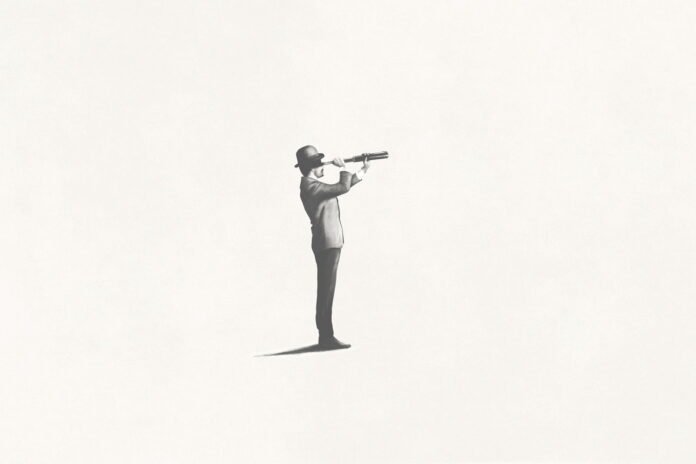There is a remarkable scene in L’heure des prédateurs (The Hour of the Predator) in which Giuliano da Empoli, the Swiss-Italian political essayist, describes a meeting of European politicians with former US President Joe Biden on the margins of a UN General Assembly. Straddling the tragic and the comic, this “last Atlantic president, the last Cold War fighter, the last internationalist”, cuts the figure of “a tired, lingering grandfather”: “All are thinking about what comes next, but he’s still there”. Should the recent reports about the real extent of Biden’s mental frailty during his presidency be true, then da Empoli’s portrait is a telling metaphor of today’s political reality: whatever remains of the world that was built under the auspices of post-war American idealism is now propped up on life support.
On the one hand, this is a classic story about the relative decline of a great power and the shaking of the geopolitical tectonic plates that results. But da Empoli’s essay is no ordinary piece of political analysis. His mission is rather to reveal the sheer novelty of the qualitative shift that is accompanying the geopolitical transformation. An alliance of populists and tech patrons is not simply seizing power, but is changing its very character. Assuming the stance of a 16th century Aztec scribe at the moment of the Spanish invasion, da Empoli describes a threat so thoroughly new that it paralyses the old guard with indecision.

Like so many others, I was sucked into the world of murky political sorcery that da Empoli portrayed in his 2022 novel Le Mage du Kremlin (The Wizard of the Kremlin), a fictionalised portrait of Vladimir Putin’s chillingly unscrupulous media wizard, Vladislav Surkov. In L’heure des prédateurs, da Empoli resuscitates the dark atmospherics of his novel and once again draws us up close to the very face of power, behind the proverbial and literal closed doors.
The world he reveals is a profoundly cynical one, evacuated of ethics or any pretence that corruption or hypocrisy are valid grounds to disqualify a person from positions of authority. But – and this is his critical point – the tendrils of the new order run deeper than the formal seats of power. Trump, Milei, Bolsonaro, Mohammed bin Salman and their likes might assume the role of the cartoon villain, but the “predators” whom da Empoli describes in fact swarm throughout the worlds of tech, business, and politics (and, of course, at the points where these spheres meet).
What is most captivating about L’heure des prédateurs is da Empoli’s unique capacity to adopt the posture of both insider and outsider, participant and observer. He is at once proximate and distant. And the force of his observations derives not so much from the analysis they offer as the atmosphere they convey. Like the best novelists, da Empoli paints whole worlds of meaning contained within a single gesture: a disingenuous smile, a condescending hand on the shoulder, a knowing laugh. It is an art that matters, for it reminds us that power is not an abstraction, but is manifest in the everyday. It is both relational and dynamic: it is not merely represented by overpowering architecture or forceful rhetoric, but in fact consists in these very things. Da Empoli’s distinctive style permits him to capture this reality better than most.
They have no knowledge of the past, they despise the present, and the future is but a narcissistic projection of their own fantasies.
Da Empoli’s proximity to power has another mesmerising effect: it permits him to convey not merely the darkness of what he witnesses, but the strangeness. For the “predators” he describes are strange indeed. They are not of this world – and do not wish to be. They are convinced that their power is not constrained by the political and social forces of old and that their dreams and ambitions will not be tempered by the weight of human experience. They feel unconstrained by such quaint, archaic notions as law or democracy – or even of politics or history full stop. They have no knowledge of the past, they despise the present, and the future is but a narcissistic projection of their own fantasies.
And yet, for all the pessimism, the register in which da Empoli presents his observations is not panicked or exaggerated. The distance of the predators from the worlds of everybody else might be a source of terror, but da Empoli knows that – however invisible it is to them – history’s spectre remains present. He does not employ history analytically: L’heure des prédateurs offers neither a linear causal story nor a rigorously researched set of historical comparisons. Instead, he summons metaphors, fables, parallels, juxtapositions, suggestions, gestures, and ambiences, shuffling up the chronologies of the past but always bringing to the fore the many historical iterations of the same ugly face.
Ultimately, the terror that da Empoli conveys in L’heure des prédateurs is a kind of terror of history. His is a portrait of a world that has surrendered its capacity to envision the future and – perhaps more consequently – its capacity to then enact and shape those visions, to would-be gods who neither inhabit the same world as us nor feel in any sense bound by its forces or conventions. In contrast to yesteryear, he reminds us, we today “have more and more information” while being “less and less able to predict the future”. It is a situation that the “predators” help foment. Our abandoned future is the free open space they make their playground.
L’heure des prédateurs by Giuliano da Empoli is published by Gallimard, 2025






